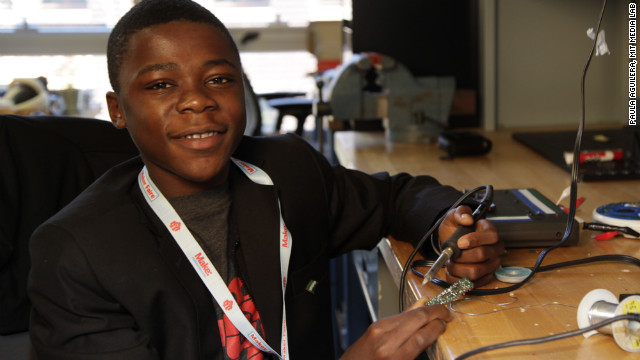
DIY Africa: Empowering a new Sierra Leone
Editor's note: David Sengeh is a doctoral student working at MIT’s Media Lab.
By David Sengeh, Special to CNN
(CNN) - When Kelvin Doe, a then-13-year-old from Sierra Leone, saw that off-the-shelf batteries were too expensive for the inventions he was working on, he made his own at home. Kelvin did not have the privilege to do his project in a school environment. Rather, he was compelled to act by necessity and for the joy of solving practical problems. Kelvin combined acid, soda, and metal, dumped those ingredients in a tin cup, waited for the mixture to dry and wrapped tape around the cup to make his first battery. He failed several times before completing a final, working prototype. He hasn’t purchased a battery since.
Next up: A generator. Kelvin made one of those by hacking an old rusty voltage stabilizer he found in a dustbin. The generator’s motor, plug, and other components are either homemade or picked from the garbage. In addition to providing electricity to his home, where neighbors come to charge their mobile phone batteries, the generator powers Kelvin’s homemade FM radio station, fully equipped with a custom music mixer, recycled CD player and antenna that allow his whole neighborhood to tune in. Now 16, Kelvin has expanded operations: he employs his friends as reporters and station managers, tasking them to interview spectators at local soccer games and keep the calendar of requests for his DJ services at parties and events. The average age of his crew is 12.
I am a doctoral student at the Massachusetts Institute of Technology (MIT) Media Lab working on developing the next generation of prosthetic sockets and wearable mechanical interfaces. I am motivated to do this work by the needs I have seen in my country, Sierra Leone, and elsewhere. At the MIT Media Lab, I have access to immense resources and expertise. But it has become apparent to me that when I take the prostheses back to Sierra Leone, the machines and technologies needed to maintain them will be left at my lab. And, as important, the recipients of the technology will not have participated in finding solutions to their problems nor shared in the joy of creation.
To create an interest in innovation - a key driver of national development - I recently launched a national high school innovation challenge, called Innovative Salone, in Sierra Leone through an international organization called Global Minimum. In March 2012, we asked students to invent solutions to problems that they saw in their daily lives. Six weeks later, 300 students submitted applications encompassing some of Sierra Leone’s toughest problems. Some of them proposed new ways of providing quality education via the radio. Others suggested new agricultural programs for their communities. Eight finalist teams received several types of assistance: $500 to develop a prototype for their ideas; access to a network of local and international mentors; an invitation to a 3-day immersive summer innovation camp; and an additional $1,000 if their initial prototypes were still considered feasible, innovative, and especially promising after the first phase of development. Kelvin and I crossed paths through the Innovate Salone program.
Kelvin, who, before this past summer’s innovation camp, had not left a 10-mile radius of his home, was at the 2012 World Maker Faire held in New York at the end of September. He was invited to participate in a “Meet the Young Makers” panel with four other amazing young makers from America. He is the youngest person in history to be invited to the “Visiting Practitioner’s Program” at MIT, and he presented his inventions to undergraduate students at Harvard College and MIT. Other people Kelvin got to interact with include technology visionaries like Nicholas Negroponte of MIT Media Lab and education leaders like President Drew Faust of Harvard University.
While Kelvin indeed has special talents, he is not the only young person in Sierra Leone ready to embrace opportunities like this. Since the launch of Innovate Salone, I have encountered young boys and girls who are pursuing their dreams. One girl has started boiling leaves because she wants to launch a fragrance company. Another young man, who has taken classes on MIT Open Courseware, is making huge strides in creating a robot in his house.
As a Sierra Leonean who was given an opportunity to pursue biomedical engineering at Harvard and now a Ph.D. at MIT, I understand that a basic set of tools and a supporting platform are needed to transform good ideas into projects that impact an entire community. Innovate Salone is hoping to make those tools and that support widely available. The youth of Sierra Leone are ready and capable of transforming their country. By providing them with resources and creative freedom, we can spark the joy of discovery that results in innovation and ultimately, national development.


Comment